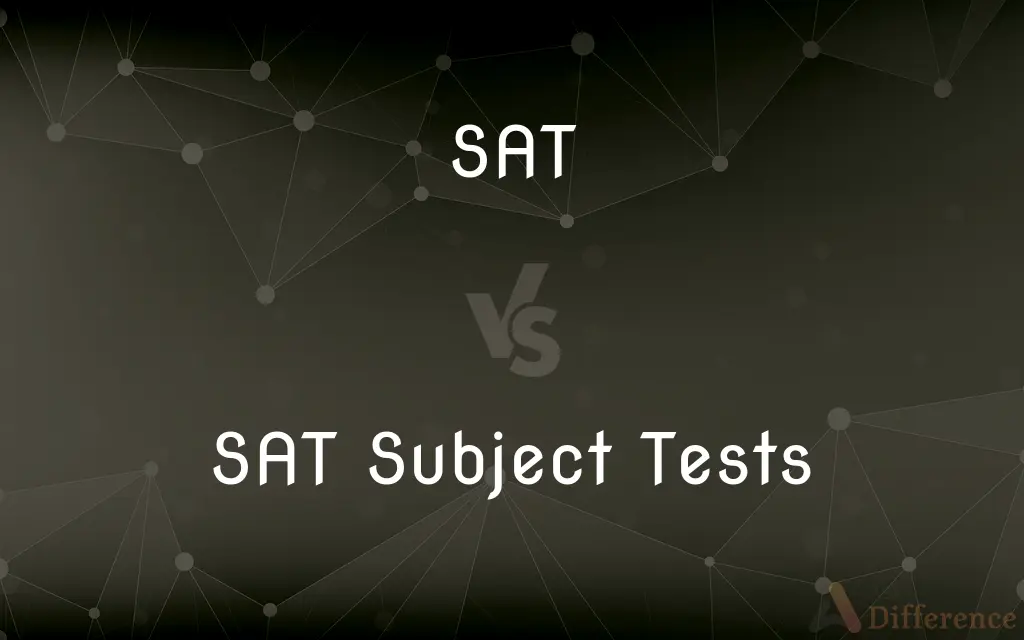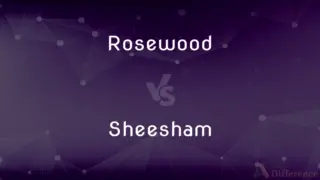SAT vs. SAT Subject Tests — What's the Difference?
By Tayyaba Rehman — Published on November 23, 2023
The SAT assesses general college readiness, while SAT Subject Tests evaluate knowledge in specific subjects.

Difference Between SAT and SAT Subject Tests
Table of Contents
ADVERTISEMENT
Key Differences
The SAT is a standardized test that measures a student's readiness for college. It evaluates mathematical skills, evidence-based reading, and writing. Conversely, SAT Subject Tests are designed to assess a student's proficiency in specific subjects like Math, History, or Languages.
Colleges and universities often use SAT scores to evaluate a student's general academic ability. Meanwhile, SAT Subject Tests offer schools a deeper look into a student’s expertise and passion for specific academic areas.
While taking the SAT is often a requirement for college applications, SAT Subject Tests are typically optional but can bolster an application, especially for programs that align with the tested subjects.
The SAT consists of three major sections: Math, Evidence-Based Reading, and Writing. The duration for this exam is 3 hours (plus 50 minutes if taking the optional essay). SAT Subject Tests, on the other hand, are one-hour-long exams focused solely on one subject.
Preparation for the SAT typically requires a broad review of high school curricula. In contrast, preparing for SAT Subject Tests necessitates focused study in the chosen subject, often mirroring high school coursework in that area.
ADVERTISEMENT
Comparison Chart
Purpose
Assesses college readiness
Evaluates knowledge in specific subjects
Content
Math, Reading, Writing
Single subjects (e.g., Biology, French)
Duration
3 hours (+50 minutes for optional essay)
1 hour per test
Typical Use
College admission requirement
Supplemental to college applications
Preparation Focus
Broad high school curricula
Specific subject coursework
Compare with Definitions
SAT
A standardized test measuring college readiness.
Sarah spent months preparing for the SAT to get a good score.
SAT Subject Tests
Examinations assessing knowledge in specific subjects.
Rebecca took the SAT Subject Tests in Math and Chemistry.
SAT
Used by colleges for admissions decisions.
Melanie's high SAT score made her a competitive applicant.
SAT Subject Tests
Mirrors high school coursework in specific subjects.
To excel in the Biology SAT Subject Test, Anna reviewed her class notes.
SAT
Evaluates mathematical, reading, and writing skills.
James struggled with the writing section of the SAT.
SAT Subject Tests
Often used to enhance college applications.
Elena's passion for languages was evident in her SAT Subject Tests scores in Spanish and French.
SAT
Contains optional essay section.
Daniel decided to take the SAT with the essay to showcase his writing.
SAT Subject Tests
Offered in various subjects from languages to sciences.
Jack, an aspiring engineer, chose to take the SAT Subject Tests in Math Level 2 and Physics.
SAT
Reflects high school curricula.
To prepare for the SAT, Lisa reviewed her high school math and English notes.
SAT Subject Tests
One-hour-long per subject.
Thomas allocated two consecutive Saturdays for his SAT Subject Tests in Physics and Literature.
SAT
Past tense and past participle of sit.
SAT
Seated; sitting (down).
SAT
Abbreviation of satisfactory
SAT
Abbreviation of satisfied
SAT
Simple past tense and past participle of sit
I sat in the middle of the park.
SAT
Abbreviation of satellite
SAT
Abbreviation of satoshi
SAT
Level of saturation (especially of oxygen in the blood).
SAT
The seventh and last day of the week; observed as the Sabbath by Jews and some Christians
Common Curiosities
How long is the SAT exam?
The SAT lasts 3 hours, with an additional 50 minutes if opting for the essay.
Can a student take multiple SAT Subject Tests?
Yes, students can take multiple SAT Subject Tests, but usually, not on the same day.
How do colleges use SAT Subject Test scores?
They provide insight into a student’s expertise in specific subjects and can bolster an application.
Which subjects are available for SAT Subject Tests?
Subjects range from languages to sciences, including Math, Literature, History, and more.
What is the primary purpose of the SAT?
The SAT measures a student's college readiness through math, reading, and writing assessments.
Are SAT Subject Tests mandatory for college applications?
SAT Subject Tests are typically optional but can enhance certain applications, especially for specific programs.
When should students typically take the SAT?
Many students take the SAT in their junior or early senior year of high school.
Which test should I focus on if I'm unsure about my major?
Focus on the general SAT if unsure, as it's commonly required for college admissions.
Can taking SAT Subject Tests make up for a lower SAT score?
While they can showcase expertise in specific areas, they don't replace the general SAT score but can complement it.
How should I prepare differently for the SAT vs. SAT Subject Tests?
For the SAT, review broad high school curricula; for SAT Subject Tests, focus on the specific subject's coursework.
Is the essay section part of the SAT or SAT Subject Tests?
The optional essay section is part of the SAT, not the SAT Subject Tests.
Should I retake the SAT or SAT Subject Tests if I'm unsatisfied with my score?
Yes, many students choose to retake the tests to improve their scores, but always consider college application deadlines.
Are SAT and SAT Subject Tests administered by the same organization?
Yes, both are administered by the College Board.
How are the SAT and SAT Subject Tests scored?
The SAT is scored on a scale of 400 to 1600, while SAT Subject Tests are on a scale of 200 to 800.
How often are the SAT and SAT Subject Tests offered?
Both are offered several times a year, but the availability might vary based on location and date.
Share Your Discovery

Previous Comparison
Switzerland vs. New Zealand
Next Comparison
Rosewood vs. SheeshamAuthor Spotlight
Written by
Tayyaba RehmanTayyaba Rehman is a distinguished writer, currently serving as a primary contributor to askdifference.com. As a researcher in semantics and etymology, Tayyaba's passion for the complexity of languages and their distinctions has found a perfect home on the platform. Tayyaba delves into the intricacies of language, distinguishing between commonly confused words and phrases, thereby providing clarity for readers worldwide.










































